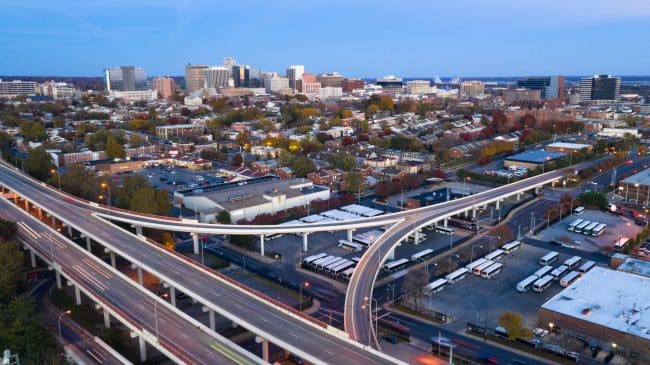With the fuel efficiency of cars increasing, and the advent of electric vehicles, the fuel tax is becoming an increasingly unsustainable way to pay for highways.
Mileage-based user fees (MBUFs), a potential successor to gas taxes, are a per-mile fee levied on road users based on the distance driven. Under this system, a user driving on a certain highway or roadway would pay a per-mile rate of, for example, two cents per mile, multiplied by the number of miles driven.
The attractiveness of mileage-based user fees is clear when contrasted with the existing highway funding mechanism, the gasoline tax. The gas tax is an ad valorem tax levied directly on drivers at the point of sale. For each gallon of fuel purchased, the driver pays a federal, state and sometimes a county or city gas tax.
The federal gas tax, which has not been raised since 1993, is 18.4 cents per gallon, while state gas taxes vary from 14.65 cents per gallon in Alaska to 58.70 cents per gallon in Pennsylvania.
While the gas tax may have adequately funded America’s highway maintenance and construction needs in the past, its effectiveness has decreased due to five primary factors:
- Increased fuel efficiency in vehicles;
- An increased number of electric vehicles, such as the Tesla, which do not pay gas taxes to use the highways in most states; and
- Increased construction and maintenance costs for roads and highways;
- Eroded purchasing power, as the gas tax was not indexed to inflation;
- Decreased fairness as the gas tax is increasingly regressive — owners of older, less fuel-efficient vehicles, who tend to be poorer, end up paying more gas taxes than owners of newer, more fuel-efficient vehicles, who tend to be wealthier.
Unlike the gas tax, mileage-based user fees treat road use similar to a household utility, such as electricity. The more electricity a household consumes, the more it pays. Charging drivers per mile means drivers pay proportionally for the exact amount of the road that they use. This is an improvement over the gas tax.
Every vehicle pays the MBUF, as opposed to the gas tax where in most states only gasoline-powered vehicles pay to use the highways. Electric car users would pay their fair share to use the highways.
An MBUF could have a defined increase schedule to reflect the cost of maintaining roadways. Increasing the existing gas tax requires congressional approval—something that is generally politically unpalatable and represents only a Band-Aid solution to today’s problems. A mileage-based user fee could be linked to inflation or could have a set schedule of increases over a 10- or 20-year period. These approaches would allow the rate to adjust with inflation and ensure that the user fees can sufficiently fund the highway system moving forward.
Naturally, there are concerns with MBUFs, but MBUF pilot projects in Oregon have shed light on them. Specifically:
(I) Administrative Costs: MBUFs may be slightly more expensive to administer than the current gas tax system, with the cost estimated at approximately five percent of collected revenue, compared to the current cost of the gas tax of two-to-five percent of collected revenues. If the amount of revenue required to administer the MBUF is significantly higher than for the gas tax, it could make it a less effective tool for highway funding. In the Oregon pilot, most of the MBUF program’s costs came from initial capital expenditures, like the equipment, software and installation costs. After these initial capital costs, the Oregon Department of Transportation (ODOT) estimates program administrative costs of approximately $1 million annually, much less than the total amount of revenue that the program would generate. If the Oregon pilot is indicative of what administrative costs might be, then an MBUF program may be more cost-effective than the gas tax in the long-term.
(II) Privacy Issues: Since an MBUF system would track a driver’s road usage, there is a concern that this information could be used by the government to monitor where and when drivers are traveling. The MBUF system does not need to know exactly where someone is driving, but a GPS device in the driver’s car could record the number of miles driven, and send that information to a third-party billing service. The state of Oregon’s permanent MBUF program uses a one-way system and third-party data collection to keep personal driver data confidential. The state does not have access to a driver’s location.
(III) Double Taxation: The user fee should replace the gas tax. If the gas tax is not outright repealed and replaced by a mileage-based user fee immediately, then road users that purchased gasoline and paid an MBUF could be refunded during the transition. Oregon already has a program in place that allows those who paid a MBUF and a gasoline tax to apply for a gas tax refund.
The mileage-based user fee represents a potential option to move away from the current gas tax, which has proven to be an ineffective way to fund highway construction and maintenance. The MBUF is a more accurate proxy for highway use, as drivers pay based on their use of the system. While there are some concerns with MBUFs, such as administration costs, privacy issues, and potential double taxation, it would be a step in the right direction toward creating a more sustainable and fair source of funding to build and maintain America’s highways.

